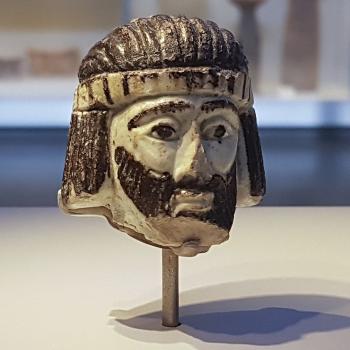I also wrote in response to promptings and suggestions from others that I can see the fusing of Northern and Southern traditions and/or the identification of El and Yahweh being aims and/or factors. I was curious what interest a Pharaoh might have in that. One intriguing possibility is that this conveys, ultimately, that Pharaoh is the lord of the king of Judah and the king of Judah is over not only Judah but all Israel, making at least a symbolic claim to a territorial extension that Josiah his father had tried to achieve for Judah and which Egypt wants as part of its own imperial aims. It would be interesting to trace this back to what collaboration there might have been between Egypt and Judah as Josiah sought to expand his territory and those in service to him began to craft a story of a united Israelite territory conquered by Joshua (echoing the name of their current king, Josiah). On the other hand, this might be putting the king of Judah in his place. Perhaps Josiah gave his son an “El” name to symbolize his aim of claiming to be rightful ruler over the northern territories/tribes and representative of their tradition, and this was telling Eliakim no, he must be content to be a vassal over his own limited domain in the south and not make the mistake his father had.
I have two related questions for friends with relevant academic expertise (and anyone else who may be interested). I posted them on Facebook yesterday but feel as though they are likely worth posting here as well.
The first is for those who work on Hebrew Bible, ancient Israel, and/or ancient Egypt. According to 2 Kings 23:34, the Egyptian Pharaoh installed Eliakim Josiah’s son as king and changed his name to Jehoiakim. Why might a Pharaoh have made that name change, and what would it represent to change a name from one name to another when both have the same meaning, except for the fact that the original name refers to the deity El and the new name refers to Yahweh?
The second question is for those who work in Judaism of the Roman era. Given the depiction of king Jehoiakim and the source of his name in 2 Kings, what significance might it have if a parent (most likely in Galilee) gave their child that name?
In case you are curious, both of these questions are tangents that emerge out of my work on my book What Jesus Learned From Women. There I’ll have a chapter about Jesus’ grandmother, Joseph’s mother, whom tradition names Anne or Anna, i.e. Hannah. Her husband according to tradition was named Joachim, an abbreviated form of Jehoiakim. I’m interested in the significance of their names and what they might indicate about Mary’s family background. I suspect it may connect with something few who work on the historical Jesus give due consideration, namely the profound oddity that Galilee in Jesus’ time considered itself Jewish to such a large extent. Galilee was the historic territory of tribes that constituted part of the northern kingdom Israel. Samaria, the territory most closely related to that earlier kingdom in Jesus’ time, was situated between Judah (from which the term “Jewish” derives) in the south and Galilee further north. Why wasn’t Galilee “Samaritan” or its own entity? This state of affairs owes something to the efforts of the Hasmoneans in the centuries immediately before Jesus. But there were surely Israelites there before that. What traditions were maintained or developed there that were different from those in Judah/Judaea and in Samaria? How did Galilee in the first century reflect a confluence of northern traditions with Judaean? The fact that 1 Enoch stems from Upper Galilee provides one clue. Perhaps Jesus also reflects this confluence, as mediated to him on his mother’s side of the family and their influence.
As for the question about the king of Judah with that name, some interesting ideas came up on Facebook.
I will add for clarification that I am interested in all of the above as literary questions as well as historical. Another possibility is that the editor of the Deuteronomistic history substituted Jehoiakim in place of an Egyptian name that mentioned an Egyptian deity and which was thus felt to be unacceptable. That editor might have done something similar with Moses’ name, and certainly did so with names like Ishbaal which he changed to Ishbosheth.
This is taking things way beyond my area of expertise, and so I’ll hand over to others to explore this in further detail and/or tell me there’s nothing of substance or plausible here. I would love to hear from anyone who has thoughts on any of the topics raised in this post!













